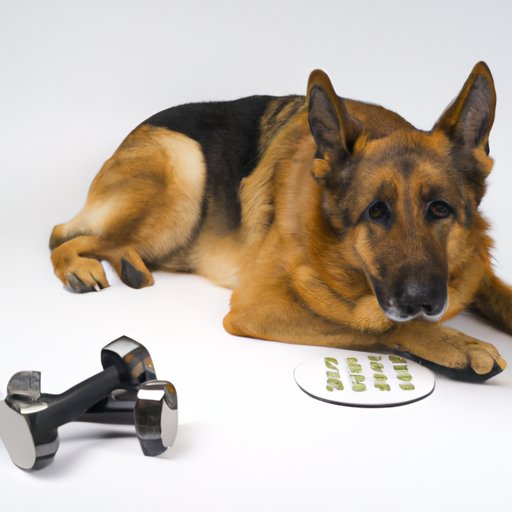
Introduction
German Shepherds are one of the most beloved dog breeds in the world, thanks to their loyalty, intelligence, and protective nature. But as a responsible pet owner, you need to ensure that your German Shepherd stays healthy and fit. One of the key aspects of maintaining your furry friend’s wellness is by keeping their weight within a healthy range. In this article, we will explore the average weight of a German Shepherd and how to maintain it effectively.
Everything You Need to Know About the Average Weight of a German Shepherd
On average, German Shepherds weigh between 50 and 90 pounds, although some can weigh more or less. Male dogs typically weigh between 65 and 90 pounds, while female dogs weigh between 50 and 70 pounds, and they can grow as tall as 2 feet to 2 feet 6 inches at the shoulder. However, factors such as age, gender, activity level, and overall health can affect your dog’s weight.
It’s important to consult with your veterinarian to determine the ideal weight range for your individual dog. They can help you choose the right diet and exercise plan to keep your German Shepherd healthy and within their ideal weight range. Remember that every dog is unique, so there’s no one-size-fits-all approach.
German Shepherd Weight: How to Keep Your Furry Friend Healthy
Maintaining a healthy weight is critical for every dog, but it’s especially important for German Shepherds since they are prone to certain health problems. Obesity can increase the risk of joint problems, including hip and elbow dysplasia, as well as other issues such as diabetes and heart disease. Therefore, it’s essential to monitor your furry friend’s weight and take steps to keep them within their ideal weight range.
You can help your German Shepherd stay healthy by providing them with a healthy diet and ensuring that they get enough exercise. Make sure that they do not overindulge in high-calorie “human foods” like cheese, bacon, or sweets. Also, avoid free-feeding which is known to make some dogs overeat. Instead, establish a regular feeding schedule.
Breaking Down the Different Factors Affecting Your German Shepherd’s Weight
Various factors can impact the weight of a German Shepherd. Genetics, age, exercise, and diet play a significant role in determining your pet’s overall weight and health. For example, puppies require more food and snacks than older dogs because they are growing rapidly, while older dogs are more sedentary and require fewer calories. Similarly, overfeeding and inadequate physical activity can cause dogs to gain weight, whereas an active dog will burn calories and maintain a healthy weight.
It’s essential to evaluate each of these contributing factors when devising a plan to help your German Shepherd maintain a healthy weight.
The Importance of Watching Your German Shepherd’s Weight: Tips and Tricks
It’s essential to keep an eye on your German Shepherd’s weight and to track changes over time. Besides visiting the veterinarian regularly, there are several practical tips and tricks you can use to monitor your dog’s weight actively.
One simple method is to weigh your dog regularly and record the measurements in a journal. You can also monitor your pet’s body condition by measuring their waist and evaluating their overall appearance. If you can see your dog’s ribs clearly, this might indicate that they are underweight, and if you feel the ribs with difficulty, this could be due to overweight.
How to Maintain a Proper Weight for Your German Shepherd: A Guide for Owners
Maintaining a healthy weight for your German Shepherd is an ongoing process that requires a thoughtful and personalized approach. Here is a step-by-step guide that can help:
- Step 1: Consult your veterinarian to determine your dog’s ideal weight range and create an appropriate diet and exercise plan
- Step 2: Measure your dog’s food precisely, use a measuring cup
- Step 3: Replace high-calorie dog treats with healthier options like carrots, apple slices, or small amounts of peanut butter
- Step 4: Provide your pet with plenty of exercise, taking them on regular walks or runs, depending on their activity level and breed
- Step 5: Monitor your dog’s progress regularly, make adjustments to their diet and exercise plan as required.
German Shepherd Weight vs. Size: What You Need to Understand
While weight is an essential factor in determining the overall health of your German Shepherd, size also plays a role. When considering your dog’s ideal weight range, it’s essential to consider their height, build, and other physical characteristics.
For example, some German Shepherds are naturally larger than others and have more substantial bone structures, which can affect their overall weight. The breed standard recommends that the body length of the German Shepherd must be longer than it is tall. A long-legged German Shepherd might be within a healthy weight range, although it seems skinny at first glance.
Why Your German Shepherd’s Weight Matters: Health Risks and Solutions
Overweight and underweight German Shepherds are vulnerable to various health problems. It’s essential to understand the potential health risks and develop sound strategies for maintaining your dog’s weight and overall health. Consider consulting your veterinarian to discuss your dog’s diet, exercise regimen, and other factors to keep your furry friend healthy and happy.
Conclusion
Maintaining your German Shepherd’s weight within a healthy range is critical to ensure their long-term health and wellness. Consult your veterinarian regularly, track your dog’s weight, and make informed decisions regarding their diet and exercise to keep them healthy, happy, and active. By caring for your furry friend’s weight and overall health, you can enjoy many years of fun, active companionship with your loyal and loving German Shepherd.




